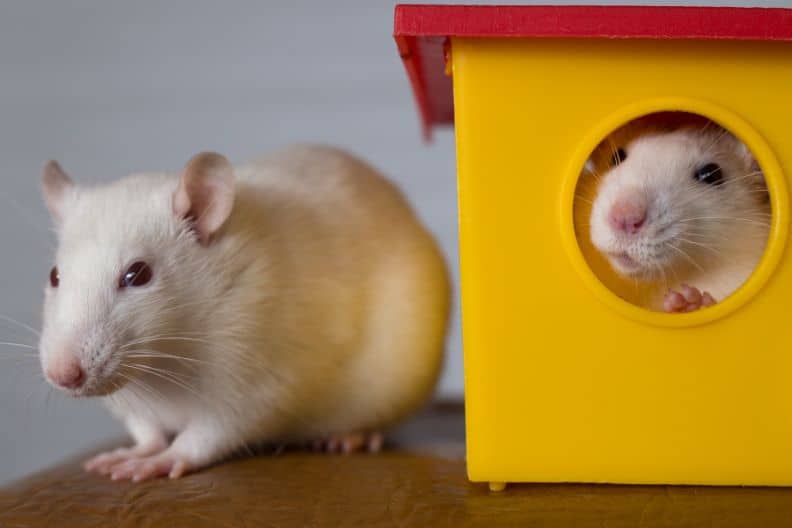If you own pet rats, you may have noticed that they occasionally fight with each other. This can be alarming, but it is important to understand that rat aggression is a common problem among pet owners.
In this blog post, we will discuss the causes of rat aggression, signs of aggression in rats, how to prevent rat aggression, and how to resolve rat aggression.

Fighting Rats: The Basics
Rats are social animals that thrive on interaction with their own kind. However, just like any other animal, they can also exhibit aggressive behavior. Rat aggression can be a serious problem if not addressed, as it can lead to injuries or even death.
What is rat aggression?
Rat aggression is any behavior that is hostile or violent between rats. This can include biting, scratching, chasing, and dominating behavior. Aggression can occur between rats of the same sex or opposite sexes.
Why do rats fight?
There are several reasons why rats may fight with each other. One of the main reasons is social hierarchy and territorial behavior.
Rats are pack animals and establish a social hierarchy among themselves. This hierarchy can be disrupted if one rat feels threatened by another or if a new rat is introduced into the group.
Another reason why rats may fight is boredom and lack of stimulation. Rats are intelligent animals that require mental and physical stimulation.
If they are kept in a small cage without any toys or activities, they may become bored and restless, leading to aggressive behavior.
Lastly, illness or injury can also cause rats to become aggressive. If a rat is in pain or discomfort, they may lash out at other rats.
Causes of Rat Aggression
Social hierarchy and territorial behavior
Rats establish a social hierarchy among themselves, with dominant rats at the top and submissive rats at the bottom.
This hierarchy can be disrupted if one rat feels threatened by another or if a new rat is introduced into the group.
To prevent rat aggression due to social hierarchy and territorial behavior, it is important to provide adequate living space for your rats.
This can include a large cage with plenty of hiding spots and tunnels. It is also important to provide multiple food and water sources to prevent competition.
Boredom and lack of stimulation
Rats require mental and physical stimulation to prevent boredom and restlessness. This can include providing toys, puzzles, and activities for your rats to play with.
It is also important to provide a variety of food and treats to keep your rats interested and engaged.
Illness or injury
If a rat is in pain or discomfort, they may become aggressive. It is important to monitor your rats for any signs of illness or injury, such as lethargy or loss of appetite.
Regular health check-ups with a veterinarian can also help prevent illness or injury.
Signs of Aggression in Rats
Obvious physical fights
Physical fights between rats are the most obvious sign of aggression. This can include biting, scratching, and chasing.
Chasing and dominating behavior
If one rat is constantly chasing or dominating another rat, this is a sign of aggression. This behavior can be particularly harmful if the dominant rat is larger or stronger than the submissive rat.
Intense staring or puffing up of fur
Rats may also exhibit aggressive behavior through intense staring or puffing up of fur. This is a sign that the rat is feeling threatened or territorial.
Preventing Rat Aggression
Providing adequate living space
One of the most important things you can do to prevent rat aggression is to provide adequate living space for your rats. This can include a large cage with plenty of hiding spots and tunnels.
It is also important to provide multiple food and water sources to prevent competition.
Providing toys and activities for stimulation
Rats require mental and physical stimulation to prevent boredom and restlessness. This can include providing toys, puzzles, and activities for your rats to play with.
It is also important to provide a variety of food and treats to keep your rats interested and engaged.
Regular health check-ups and veterinary care
Regular health check-ups with a veterinarian can help prevent illness or injury that may lead to rat aggression.
It is also important to seek veterinary care if you notice any signs of illness or injury in your rats.
Resolving Rat Aggression
Separating the rats
If rat aggression is severe, it may be necessary to separate the rats. This can be done by providing separate living spaces for each rat or by separating the aggressive rat from the others.
Introducing rats slowly and properly
If you are introducing a new rat to your group, it is important to do so slowly and properly. This can include introducing the rats in neutral territory and monitoring their behavior closely.
Providing mediation and positive reinforcement
If rats are exhibiting mild aggression, it may be possible to provide mediation and positive reinforcement to resolve the issue. This can include providing treats or toys to distract the rats from aggressive behavior.
Conclusion
Rat aggression is a common problem among pet owners, but it can be addressed with proper care and attention. By providing adequate living space, toys and activities for stimulation, and regular health check-ups, you can prevent rat aggression before it becomes a serious problem.
If you notice any signs of aggression in your rats, it is important to address the issue immediately to prevent injuries or harm to your pets. Understanding and addressing rat aggression is essential for the health and wellbeing of your pet rats.
- How Long Do American Eskimo Dogs Live? Important Factors and Care Tips - September 29, 2023
- Do American Bulldogs Need Grooming? Essential Tips and Care Guidelines - September 29, 2023
- Do Bengal Cats Enjoy Playing? Essential Tips for Keeping Them Active - September 29, 2023